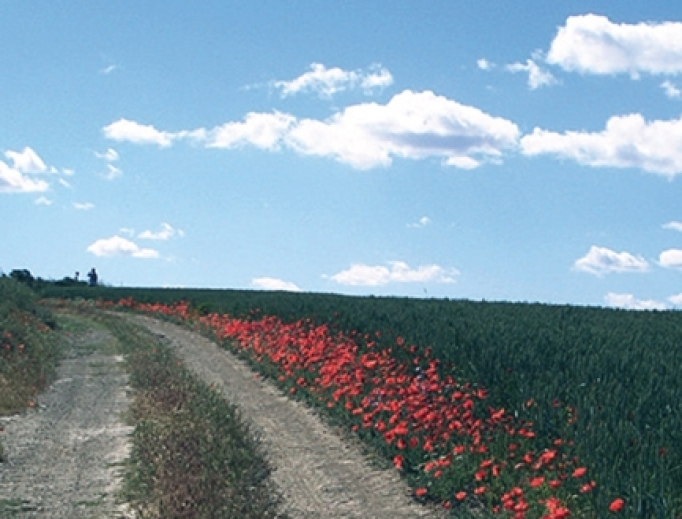Lessons of St. Ignatius Along the ‘Way’
BOOK PICK: On the Ignatian Way: A Pilgrimage in the Footsteps of St. Ignatius of Loyola

ON THE IGNATIAN WAY
A Pilgrimage in the Footsteps of St. Ignatius Loyola
By Father José Luis Iriberri, SJ
Ignatius Press, 2018
206 pages, $17.95
To order: ignatius.com or (800) 651-1531
The family and friends of the young Inigo would not have predicted he would become one of the most influential saints in the history of Christianity. Yet that is who St. Ignatius Loyola became.
It was not his doing, but an act of God in Christ Jesus to rescue a young man hell-bent on self-destruction. Instead, his life was transformed through a painful and ultimately illuminating pilgrimage of self-discovery. God accomplished this fearsome act not only for St. Ignatius. He did it also to gift the Church and the entire world with highly pragmatic and accessible tools for Christian growth in holiness and spiritual discernment.
How did this happen? At the age of 30, the soldier Inigo, wounded in battle, lay in bed fantasizing about two possible directions his future life might take. One fantasy was self-indulgent and narcissistic. He would win the hand in marriage of the daughter of the king and queen of Spain. The other fantasy was a path of mortification and selflessness. He would imitate the saints whose life stories he was reading.
One day he “awoke” and realized that the holy fantasies left him peaceful and content, while the grandiose ones left him dry and dissatisfied. In that instant of awakening, he saw his life honestly, realized he needed to do much penance for his past sins, and seeking God’s forgiveness, he felt compelled to pilgrimage to Jerusalem to show his devotion to Christ.
On the Ignatian Way: A Pilgrimage in the Footsteps of St. Ignatius of Loyola gives people today a new way to personally experience a conversion experience like St. Ignatius through his Spiritual Exercises, done as an actual pilgrimage on the same roads he took. The book is a collaborative project between the Spanish Jesuit Father José Iriberri and a layman, Christopher Lowney, who have since 2011 perfected this “new pilgrimage for a new age.”
Apart from excellent introductory materials by these two skilled Ignatian veterans, and the actual prayer materials for the 400-mile “Ignatian Way” that compromise Part Three, there are nine short autobiographical accounts of actual pilgrims who have made the journey.
The introductory materials whet the appetite for those thinking of making the actual pilgrimage. But the majority of those home-bound pilgrims who will journey vicariously via the spiritual autobiographies of those who “walked alone and on foot” from Loyola, to Montserrat, to Manresa (and, for some, finally to Barcelona), will not be disappointed.
Lowney in Part One (“Walking With Ignatius”) presents the pilgrim readers with a lovely and winsome biography of St. Ignatius’ early life and conversion, as well as an insightful section on 10 lessons St. Ignatius teaches us.
One important lesson is that pilgrims realize a startling fact: We don’t “control” our own world. And an inability to accept that fact led St. Ignatius to “think that a novice pilgrim unable to endure the lack of sleep and bad food could not be fit material for the Jesuits.”.
Father Iriberri in Part Two (“The Ignatian Way: A Healing Path to Freedom”) skillfully outlines what trials and illuminations any Christian pilgrim can expect, whether they make the Ignatian Way or walk a path to Christian freedom on their home turf. He honestly relates the price of spiritual illumination.
All readers/pilgrims learn that to be holy, one must be prepared not to feel holy. Conversion is a lifelong journey. This was what Ignatius himself had to confront.
Father Iriberri writes: “And the fact is we are all wounded beings by nature … wounded by routine and by the abandonments we have experienced … and as a physiologist friend told me when I questioned the existence of a wound in my own life: If you do not want to recognize it, then do not; but that is not going to make your wound any smaller. Denying it is not going to help heal it.”
All the pilgrim autobiographies of laity and religious that follow reveal the discovery of human woundedness and sin. But that fearsome discovery along the Ignatian Way ultimately uplifts all of them as they discover Christ as their healer and Savior.
Readers or real pilgrims of the Ignatian Way will be drawn into the story of their own woundedness, but they journey eventually to that same wholeness and holiness in Christ.
Jesuit Father William Watson is the founder and president of the Sacred Story Institute,
which forms missionary disciples through the promotion of Ignatian spirituality.
- Keywords:
- book picks
- ignatian way
- st. ignatius of loyola

















